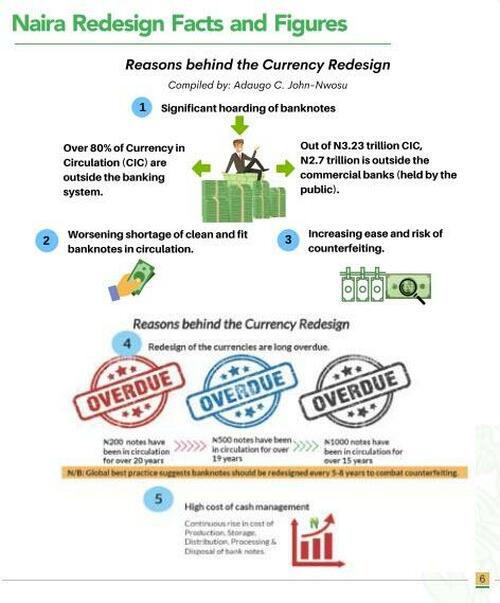
Authored by Martin Armstrong via ArmstrongEconomics.com,
The transition to CBDC in Nigeria did not go as planned. The elites always seek out African nations to use as their test subjects. Nigeria attempted to slowly roll out the program dubbed eNaira built on the Hyperleger Fabric blockchain. The Central Bank of Nigeria (CBN) is solely responsible for running the nodes of this digital currency. Beginning stress tests stated this currency could execute 2,000 transactions per section. In October 2021, the government began offering incentives to citizens who chose to CBN.
A year later, the country was still hesitant to make the switch so the central bank began implementing forceful measures. In October 2022, the CBN decided to cancel and resign the currency in a “move aimed at restoring the control of the Central Bank of Nigeria (CBN) over currency in circulation.”
They stated that the original paper notes would only be legal tender until January 31, 2023, leaving the people with no alternative but to convert their cash. Nigerians were no stranger to the concept of currency cancellation as it is something the government has routinely done.
The CBN openly announced that the end goal was to target a 100% cashless society replaced with eNaira. Fewer than 0.5% of Nigerians adopted the eNaira and protests erupted across the nation.
The central bank set a cash withdrawal limit of ₦100,000 ($225) per week for individuals and ₦500,000 ($1,123) for businesses. Citizens wishing to take out larger sums were subject to a processing fee between 5% and 10%. ATMs were limited to ₦20,000 ($45) per day, and only ₦200 ($0.45) notes or lower denominations were available in the machines.
@tyson_melbourne6 ♬ Epic - DM Production
Bloomberg reported that 90% of the country previously used cash for transactions. They did not want to convert to CBDC but were provided with no alternative. Demonetizing the currency reduced available cash from 3.2 trillion nairas to 1 trillion nairas. This led to the central bank creating over 10 billion eNairas. The people are continually protesting these measures as their society which was largely dependent on cash interactions has been destabilized.
This is how it all begins.
They are using Nigeria and other countries as test subjects before rolling out these programs in the West. It is hard for Americans to fathom currency cancelation, as it has never occurred here.
Yet, the Federal Reserve has made it clear that they are looking into this option. Per usual, they market it as a “convenience” for the people.
In truth, it is a way to ensure money stays on the grid under the thumb of government. They will not allow one cent to go untaxed, and as the program expands, they can remove individuals and organizations from participating in society entirely.
Authored by Martin Armstrong via ArmstrongEconomics.com,
The transition to CBDC in Nigeria did not go as planned. The elites always seek out African nations to use as their test subjects. Nigeria attempted to slowly roll out the program dubbed eNaira built on the Hyperleger Fabric blockchain. The Central Bank of Nigeria (CBN) is solely responsible for running the nodes of this digital currency. Beginning stress tests stated this currency could execute 2,000 transactions per section. In October 2021, the government began offering incentives to citizens who chose to CBN.
A year later, the country was still hesitant to make the switch so the central bank began implementing forceful measures. In October 2022, the CBN decided to cancel and resign the currency in a “move aimed at restoring the control of the Central Bank of Nigeria (CBN) over currency in circulation.”
They stated that the original paper notes would only be legal tender until January 31, 2023, leaving the people with no alternative but to convert their cash. Nigerians were no stranger to the concept of currency cancellation as it is something the government has routinely done.
The CBN openly announced that the end goal was to target a 100% cashless society replaced with eNaira. Fewer than 0.5% of Nigerians adopted the eNaira and protests erupted across the nation.
The central bank set a cash withdrawal limit of ₦100,000 ($225) per week for individuals and ₦500,000 ($1,123) for businesses. Citizens wishing to take out larger sums were subject to a processing fee between 5% and 10%. ATMs were limited to ₦20,000 ($45) per day, and only ₦200 ($0.45) notes or lower denominations were available in the machines.
@tyson_melbourne6♬ Epic – DM Production
Bloomberg reported that 90% of the country previously used cash for transactions. They did not want to convert to CBDC but were provided with no alternative. Demonetizing the currency reduced available cash from 3.2 trillion nairas to 1 trillion nairas. This led to the central bank creating over 10 billion eNairas. The people are continually protesting these measures as their society which was largely dependent on cash interactions has been destabilized.
This is how it all begins.
They are using Nigeria and other countries as test subjects before rolling out these programs in the West. It is hard for Americans to fathom currency cancelation, as it has never occurred here.
Yet, the Federal Reserve has made it clear that they are looking into this option. Per usual, they market it as a “convenience” for the people.
In truth, it is a way to ensure money stays on the grid under the thumb of government. They will not allow one cent to go untaxed, and as the program expands, they can remove individuals and organizations from participating in society entirely.
Loading…




